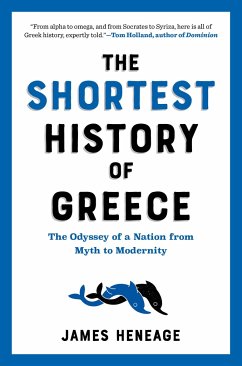
The Edinburgh History of the Greeks, 1453 to 1768
The Ottoman Empire
Versandkostenfrei!
Versandfertig in über 4 Wochen
128,99 €
inkl. MwSt.

PAYBACK Punkte
64 °P sammeln!
A 10-volume series covering the history of Greece and the Greeks, over the last 3,500 years, from antiquity to the present. Each volume combines political history with social and cultural history to tell the story of the Greek people in a novel and innovatory way.
"The Edinburgh History of the Greeks, 1453 to 1768 comprehensively covers the cultural, economic and political development of the Greeks under Ottoman rule. It fills a crucial vacuum in the field and performs a much needed role as a basic text on the history of an important community of the Balkans and Anatolia over the full span of its half millennium experience of Ottoman rule." Rhoads Murphy, Reader in Ottoman Studies, University of Birmingham An examination of the history of the Greeks in the Ottoman Empire Molly Greene provides a new interpretation of the Ottoman centuries, drawing extensively on recent Greek scholarship. Moving beyond old models of a cohesive and autonomous Greek community living behind communal walls, she demonstrates the variety of Greek experience under the sultans and asks what Ottoman subjecthood meant for Christians in general and Greeks in particular. Larger debates in Ottoman historiography are also integrated into the history of the Greeks. The book will appeal not only to those interested in the Greek experience, but Ottoman historians as well. Key Features - Covers the period from the arrival of Evrenos Bey in Thessaly in 1400 through to 1770 - Depicts a Greek world that is very different, both from the well-known contours of Greek antiquity as well as from the modern nation-state of Greece - Includes illustrations, maps, a timeline, and a further reading section Molly Greene is Professor of History and Hellenic Studies at Princeton University. Cover image: The stone bridge built by Bessarion, Archibishop of Larissa, in the first half of the sixteenth century, just outside the village of Pyli, near Trikala (c) Molly Greene Cover design: [EUP logo] www.euppublishing.com












